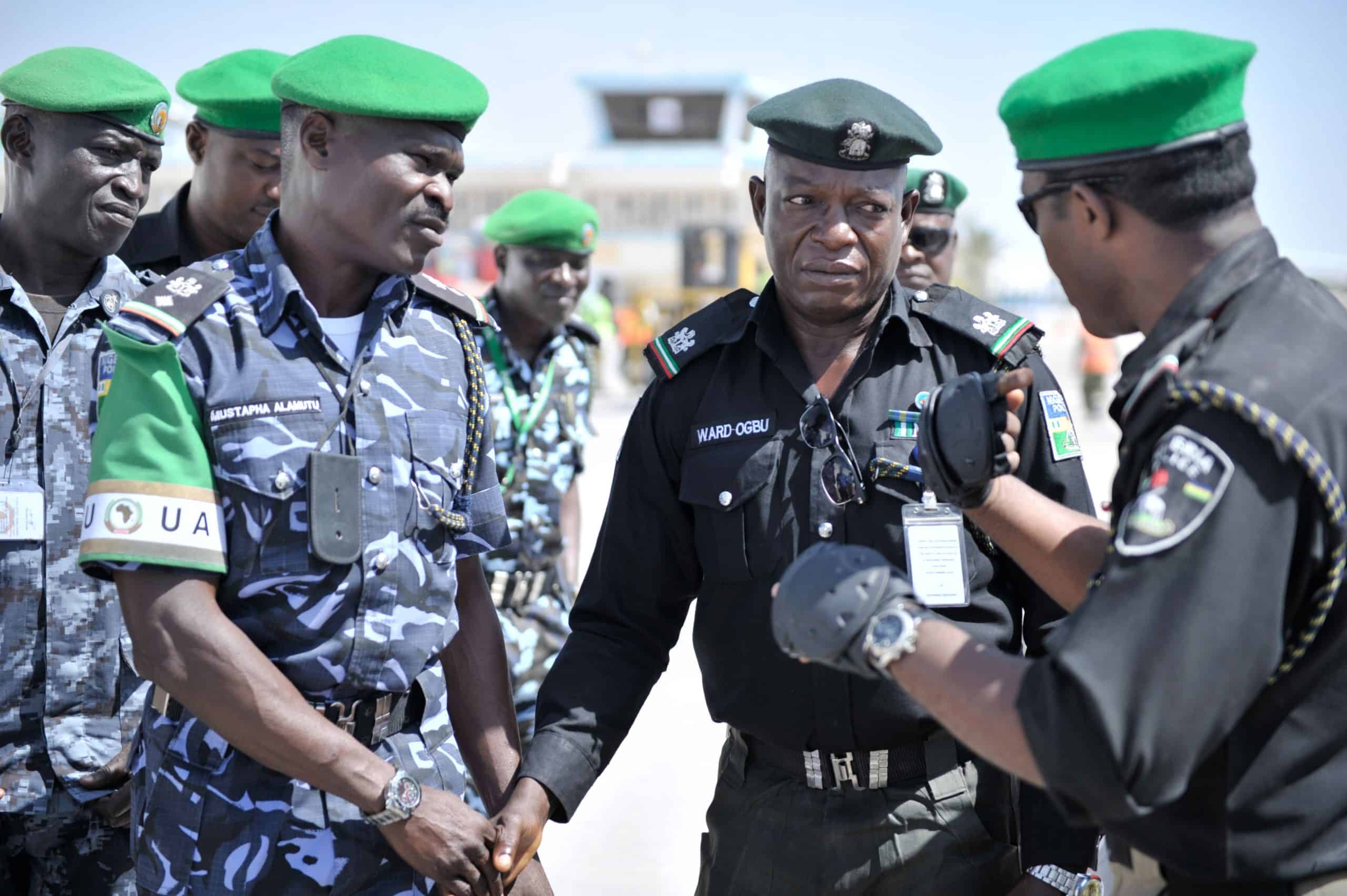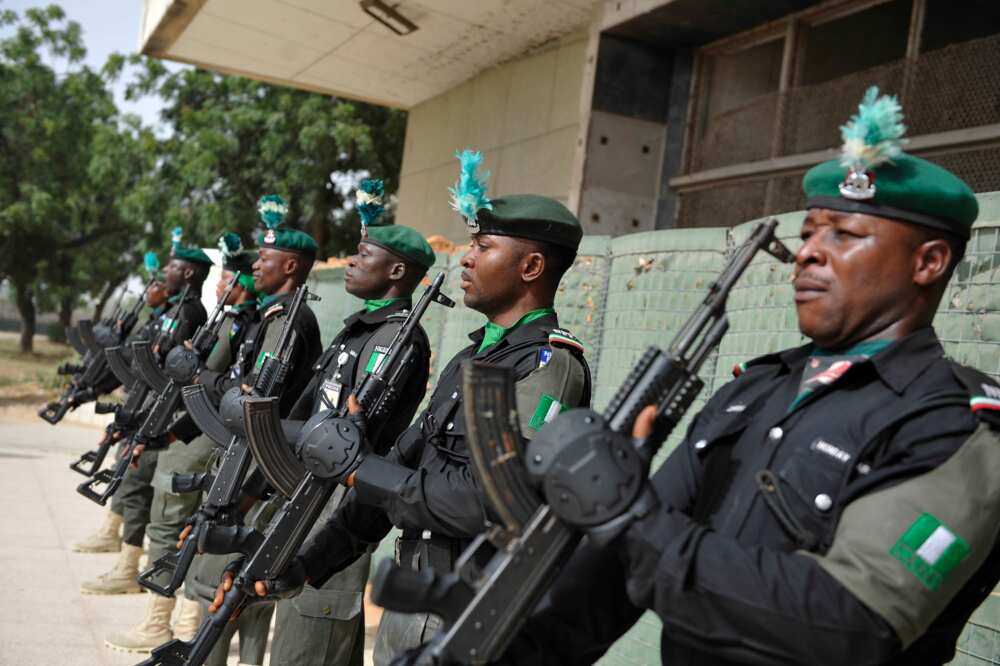Unpacking The Hierarchical Structure Of The Nigerian Police Force: A Critical Analysis
Does the structure of police ranks in Nigeria truly dictate the effectiveness of its law enforcement? This question has been at the heart of numerous debates surrounding the Nigerian Police Force (NPF). Established in 1930, the NPF stands as the primary law enforcement agency in the country, tasked with ensuring public safety and upholding the rule of law. Over the decades, the NPF has undergone significant transformations to adapt to the ever-evolving landscape of Nigerian society. Understanding the intricate hierarchy and the specific duties tied to each rank within the NPF is paramount to comprehending the complex dynamics of maintaining law and order in the nation.
The mandate of the NPF is clear: to ensure the safety and security of the public and uphold the rule of law. Recognizing the significance of police ranks within the NPF offers civilians a better understanding of the chain of command, fostering a culture of respect for authority. It also allows them to appreciate how law enforcement functions at various levels. The structure of the NPF is built on a robust hierarchy, with each rank playing a distinct role in the broader mission of the force. This intricate system of ranks not only defines the roles and responsibilities of individual officers but also influences the overall effectiveness of the organization.
| Rank | Abbreviation | Responsibilities |
|---|---|---|
| Inspector General of Police | IGP | Overall head of the police force. |
| Deputy Inspector General of Police | DIG | Assists the IGP in managing the police force. |
| Assistant Inspector General of Police | AIG | Oversees specific zones or regions. |
| Commissioner of Police | CP | In charge of a state or large unit. |
| Deputy Commissioner of Police | DCP | Assists the CP in managing police operations. |
| Assistant Commissioner of Police | ACP | Supervises specific departments. |
| Chief Superintendent of Police | CSP | Manages police divisions. |
| Superintendent of Police | SP | Leads police units. |
| Deputy Superintendent of Police | DSP | Assists the SP in unit management. |
| Assistant Superintendent of Police | ASP | Entry-level management position. |
| Inspector | INS | Oversees constables and investigations. |
| Sergeant | SGT | Supervises constables. |
| Corporal | CPL | Assists sergeants in their duties. |
| Constable | CPL | Entry-level rank in the police force. |
For reference, visit the official website of the Nigerian Police Force here.
- Jeffers Funeral Home Obituaries Services In Greeneville Tn
- Pauletta Washington Photos Family More On Denzels Wife
The foundation of the NPF rests on its lower ranks. These individuals are the first responders, the foot soldiers, and the constant presence on the streets, working diligently to ensure public safety. The effectiveness of their actions directly impacts the public's trust and confidence in the police force. At the entry level, the Constable plays a vital role in community policing, building relationships, and gathering crucial information. They are responsible for patrolling designated areas, responding to emergency calls, and providing initial assistance at crime scenes.
The Corporal serves as a bridge between the Constables and the Sergeants, assisting Sergeants in supervising Constables and taking on additional responsibilities such as leading small teams during operations. Their experience and guidance are essential for the development and effectiveness of junior officers. Meanwhile, the role of the Sergeant is crucial. Sergeants oversee the daily activities of Constables and Corporals, ensuring that operations are conducted efficiently and professionally. They are responsible for reporting on their team's performance to higher ranks, offering mentorship, and maintaining discipline within their units. A competent Sergeant is often the key to a well-functioning and effective police unit.
The middle ranks form the operational engine of the NPF, managing units, overseeing investigations, and implementing policies. They bridge the gap between the lower ranks and the higher echelons of command, ensuring that directives are carried out effectively and that resources are allocated appropriately. The Assistant Superintendent of Police (ASP), for instance, holds an entry-level management position, overseeing specific units or departments such as investigations, patrol, or administration. Their role is critical in ensuring that police operations align with the force's overall goals and objectives. They are involved in planning, organizing, and directing the activities of their assigned units.
The Deputy Superintendent of Police (DSP) assists the Superintendent in managing police units, taking on significant responsibilities including leading investigations, managing administrative tasks, and supervising personnel. They play a crucial role in implementing policies and procedures, ensuring that the unit operates in accordance with the law and departmental guidelines. Meanwhile, the Superintendent of Police (SP) is a significant leadership position, responsible for leading police units, managing personnel, and ensuring that operations run smoothly. They are accountable for the effectiveness of their unit and report directly to higher-ranking officials such as the Commissioner of Police or Deputy Commissioner of Police. Their leadership skills and strategic thinking are essential for maintaining order and responding to complex situations.
At the higher echelons, Chief Superintendents of Police (CSPs) manage entire divisions, overseeing a range of police activities within their jurisdiction. They are responsible for strategic planning, resource allocation, and the implementation of policies. They play a vital role in maintaining law and order, ensuring the safety and security of the community, and building relationships with local stakeholders. Their decisions have a broad impact on the effectiveness and public perception of the police force. Moving up the ranks, Assistant Commissioners of Police (ACP) supervise specific departments within the police force, ensuring that policies and procedures are followed. They often assist in strategic planning and resource management, playing a crucial role in the efficient and effective operation of the force.
Deputy Commissioners of Police (DCP) assist the Commissioner in managing police operations at the state level, responsible for policy implementation, supervision of police activities, and coordination with other law enforcement agencies. Their responsibilities often include overseeing investigations, managing budgets, and addressing community concerns. The Commissioner of Police (CP) is in charge of a state or a large unit within the police force, overseeing all police activities within their jurisdiction and maintaining law and order. Their decisions have a direct impact on the safety and security of the citizens within their area of responsibility.
At the pinnacle of the hierarchy, the Deputy Inspector General of Police (DIG) assists the Inspector General in managing the police force, overseeing multiple states or departments, and ensuring that policies are implemented effectively across jurisdictions. The Inspector General of Police (IGP) is the highest-ranking officer in the Nigerian Police Force, responsible for the overall management and administration of the force, setting policies, and ensuring public safety across the nation. The IGP is accountable for the performance and conduct of the entire police force, ensuring that it operates within the framework of the law and in the best interests of the public.
The process of joining the Nigerian Police Force is designed to identify and recruit individuals who are suitable for the demanding role of law enforcement. The recruitment process is multi-staged, aiming to ensure the selection of competent, qualified, and committed officers. Candidates submit their applications online or at designated recruitment centers, providing basic biographical information and outlining their qualifications. They undergo preliminary screening to verify their qualifications, educational background, and eligibility based on specific criteria such as age and nationality. Candidates are required to pass physical fitness tests and comprehensive medical examinations to assess their health and physical ability to perform the duties of a police officer.
Successful candidates take a written examination that assesses their knowledge, aptitude, and suitability for the police force. The examination covers a range of topics, including general knowledge, current affairs, and reasoning skills. Candidates who pass the written examination are interviewed by senior police officers. The interview is designed to assess their character, communication skills, and suitability for a career in law enforcement. Selected candidates undergo rigorous training at police academies before being assigned to their respective ranks. The training provides them with the necessary skills, knowledge, and values to perform their duties effectively and professionally.
The Nigerian Police Force faces numerous challenges that impact its ability to effectively maintain law and order. These challenges include inadequate funding, insufficient training, corruption, and a lack of modern equipment. Addressing these issues requires a multi-faceted approach, including increased funding, improved training programs, the adoption of technology, and a commitment to ethical conduct and accountability. Insufficient financial resources hinder the ability of the NPF to provide adequate equipment, training, and resources to its officers. A lack of comprehensive and up-to-date training programs can limit the effectiveness of officers in handling complex situations and using modern law enforcement techniques. Corruption remains a significant challenge, eroding public trust and undermining the legitimacy of the police force.
The absence of modern technology and equipment, such as vehicles, communication systems, and forensic tools, can hamper investigations and response times. Negative perceptions of the police, often stemming from instances of misconduct or corruption, hinder cooperation between the police and the public. Poor working conditions, low salaries, and a lack of social support can negatively affect officer morale and performance. The effectiveness of the NPF is not only a reflection of its hierarchical structure but also its ability to address these challenges head-on. As Nigeria continues to evolve, so too must its law enforcement agencies, ensuring they remain equipped to meet the demands of a modern, dynamic society.
In the broader context, the challenges faced by the Nigerian Police Force mirror those experienced by law enforcement agencies globally. The rise of cybercrime, transnational organized crime, and the increasing sophistication of criminal networks demand a reevaluation of traditional policing methods. The NPF must collaborate with international partners, adopt cutting-edge technologies, and invest in continuous professional development to remain effective. Furthermore, fostering greater community engagement and trust-building initiatives could significantly enhance the force's reputation and operational capabilities. As Nigeria continues to grapple with socio-economic challenges, the role of the NPF becomes increasingly vital in ensuring stability and security for its citizens.
- Blackfoot Id Obituaries Find Recent Past Death Notices Today
- Jeffers Funeral Home Obituaries Services In Greeneville Tn

Nigeria Police Shortlisted Candidate www.policerecruitment.gov.ng

Nigerian police ranks and symbols All you need to know about them

Nigeria Police salary by ranks (2024) MakeMoney.ng